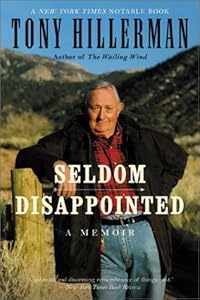Tony Hillerman wasn't drafted, and in fact because once his older brother was drafted he was the sole remaining son of a widow he was exempt from the draft, but once he failed to make a go of college the first time he essentially volunteered for the infantry. The second quarter of his memoir Seldom Disappointed covers his time in the Army, his convalescence, and his return to civilian life.
Hillerman is the first writer I've read whose account of World War II sounded anything like Joseph Heller's novel Catch-22: reserve troops are sent on fool's errands, replacements are killed minutes after arriving, Army intelligence is almost never right, and officers are generally well-fed and unconcerned with the health and well-being of their men.Most of Hillerman's anecdotes involve marching from one place to another with inappropriate armaments and gear, losing weapons or gear, sloshing through mud, digging foxholes, lying in the mud in foxholes, and getting up the next day to do the same thing in a different direction. He serves out his tour of duty in Europe, skirts the Battle of the Bulge, is awarded the Bronze Star and the Silver Star, steps on a land mine and loses his sight, and is finally sent Stateside at the end of the war for surgery that is abruptly canceled when he is discharged.
On his return Hillerman is impressed with the way a journalist mills segments of his letters to his mother into a passable newspaper article about him and decided to invest his access to education due to the GI Bill to become a journalist, "whatever that was," and a chance encounter with some Navajos in ceremonial dress in the Four Corners area apparently completes the outline of the rest of his life.
I am repeatedly surprised at the balance between the gratitude Hillerman shows for how one accident after another improves his lot in life, and how his primitive Catholicism frames his generally decent behavior day to day, but how these two elements of his outlook never quite coalesce: it's as if God lives somewhere else and Hillerman communicates with Him via a ritual once in a while, while the luck bordering on grace that shapes his life doesn't demand explanation. I sometimes wonder if how much of this missed connection is late artifice by the older Hillerman and how much of it is a fair representation of his state of mind fifty years earlier.
exercises in compound storytelling
Subscribe to:
Post Comments (Atom)

![Reblog this post [with Zemanta]](http://img.zemanta.com/reblog_c.png?x-id=db5e7f43-9f16-4545-89cf-78b74bdc6e7b)

No comments:
Post a Comment